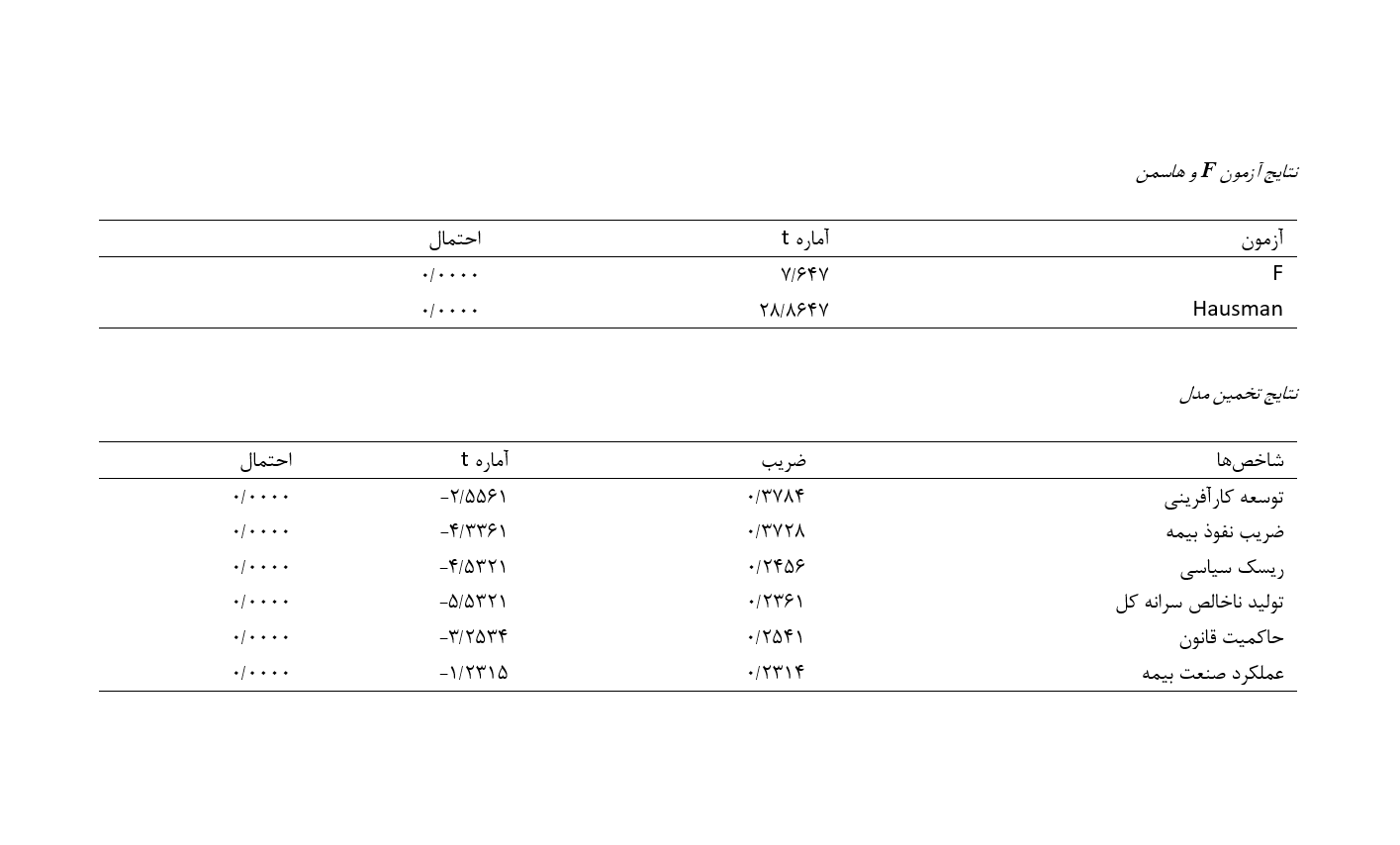Presenting a Model for Determining Key Performance Indicators of the Insurance Industry on the Development of the Entrepreneurial Ecosystem Using the Panel Data Approach in Selected Countries (2010-2020)
Keywords:
Key performance indicators of the insurance industry, entrepreneurial ecosystem development, selected countries, panel dataAbstract
The objective of the present article is to propose a model for determining the key performance indicators (KPIs) of the insurance industry on the development of the entrepreneurial ecosystem using the panel data approach in selected countries during the period from 2010 to 2020. The statistical population of this study includes selected countries (the Philippines, Iran, Kazakhstan, South Africa, Hungary, Sweden, Poland, Peru, Mexico, Argentina, Brazil, Colombia, Malaysia, Australia, Thailand, Croatia, the United States, the United Kingdom, and Norway), utilizing the panel data method. For this purpose, data related to the selected countries over the 2010-2020 period were employed, using the panel data approach. Eviews version 21 software was used for data analysis. The analysis results indicated a significant correlation between the performance of the insurance industry and the variables of entrepreneurial development, insurance penetration rate, political risk, gross domestic product per capita, and the rule of law. The Levin, Lin, and Chu test was used to measure the reliability of the indicators. The results showed that all the examined indicators are reliable. The results of the co-integration test revealed a strong long-term relationship between the variables used. The estimated coefficient of the model for the variables—entrepreneurial development, insurance penetration rate, political risk, gross domestic product per capita, the rule of law, and insurance industry performance—are -0.3784, -0.3728, -0.2456, -0.2361, -0.2541, and 0.2314, respectively. For instance, the estimated coefficient for gross domestic product (GDP) per capita is -0.2361, indicating that a 1% increase (or decrease) in GDP per capita results in a 0.2361% decrease (or increase) in the insurance industry's performance indicator.
Downloads
References
Ahmadi, S., Akhavan Mahdavi, M., & Mokhtari, M. (2018). Identifying Entrepreneurial Opportunities in Social Sciences
and Sociological Explanation of Factors Affecting the Exploitation of Opportunities in Iran. Journal of Applied
Sociology, 29(3), 181-202. https://doi.org/10.22108/jas.2018.107627.1219
Buana, Y., Hidayat, D., & Prayogi, B. (2020). The Effect of Entrepreneurship Education on Entrepreneurial Intention of
University Students by Adopting Linan Model. Binus Business Review, 8(1), 67-75.
https://doi.org/10.21512/bbr.v8i1.1958
Karami, S., Malamirzaei, F., & Movahedi, R. (2016). The Impact of Entrepreneurship Education and Its Benefits on the
Entrepreneurial Intentions of Agricultural Students in Western Universities. Journal of Agricultural Education
Management Research, 8(38), 51-65. https://itvhe.areeo.ac.ir/article_107203.html
Koushki Jahromi, A. R., & Boodlaei, H. (2020). Examining the Relationship Between Organizational Knowledge
Management Factors and Organizational Entrepreneurship. First Annual Conference on Management, Innovation,
and Entrepreneurship, Shiraz.
Maarefvand, A., & Shafiabady, A. (2024). Effectiveness of Shafie-Abadi's Multidimensional Model Training on
Enhancing Occupational Well-being and Quality of Work Life among Teachers in Qom City. International Journal
of Education and Cognitive Sciences, 4(4), 21-30. https://doi.org/10.61838/kman.ijecs.4.4.3
Malekpour Lapari, K., & Delavar, A. (2016). The Role of University Education in Creating Entrepreneurial Spirit and
Strategies for Enhancing It. Educational Research Journal(3 and 4). https://erj.khu.ac.ir/article-1-115-fa.html
Miri Rami, S. F., Delgoshaei, Y., & Mahmoudi, A. H. (2022). Identification and Analysis of Effective Factors on the
Strategic Intelligence of Education Districts Managers of Tehran City and Provide an Appropriate Model [Research
Article]. Iranian Journal of Educational Sociology, 5(1), 113-125. https://doi.org/10.61186/ijes.5.1.113
Rezaei, F., & Faghih Abdollahi, A. (2019). The Impact of Entrepreneurship Education on Entrepreneurial Intentions and
Psychological Characteristics of Employees (Case Study: Entrepreneurship Centers of Physical Education Colleges
in the Country). Second International Conference on New Horizons in Basic Sciences and Engineering, Tehran.
Saeed, S., Yousafzai, S. Y., Yani-De-Soriano, M., & Muffatto, M. (2020). The role of perceived university support in
the formation of students' entrepreneurial intention. Journal of Small Business Management, 53(4), 1127-1145.
https://doi.org/10.1111/jsbm.12090
Santos, D., Zen, A., & Schmidt, V. (2017). Entrepreneurship Ecosystems and the Stimulus to the Creation of Innovative
Business: A Case in the App Industry in Brazil. Journal of Research in Business, Economics and Management, 8(5).
https://www.researchgate.net/publication/334261038_RESEARCH_ORGANISATION_Entrepreneurship_Ecosyst
ems_and_the_Stimulus_to_the_Creation_of_Innovative_Business_A_Case_in_the_App_Industry_in_Brazil
Vamvaka, V., Stoforos, C., Palaskas, T., & Botsaris, C. (2020). Attitude toward entrepreneurship, perceived behavioral
control, and entrepreneurial intention: dimensionality, structural relationships, and gender differences. Journal of
Innovation and Entrepreneurship, 9(1). https://doi.org/10.1186/s13731-020-0112-0
Zollo, L., Laudano, M. C., Ciappei, C., & Zampi, V. (2020). Factors affecting universities' ability to foster students'
entrepreneurial behaviour: An empirical investigation. Journal of Management Development.
ntrepreneurial_behaviour_An_empirical_investigation

Downloads
Published
Submitted
Revised
Accepted
Issue
Section
License
Copyright (c) 2024 Journal of Technology in Entrepreneurship and Strategic Management (JTESM)

This work is licensed under a Creative Commons Attribution-NonCommercial 4.0 International License.










